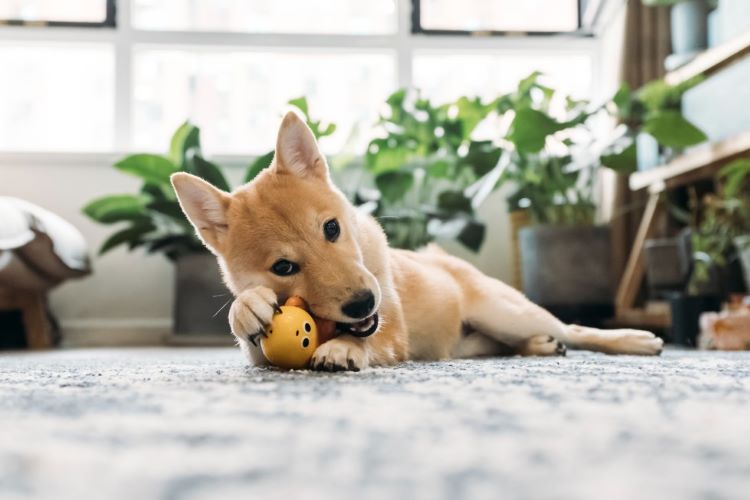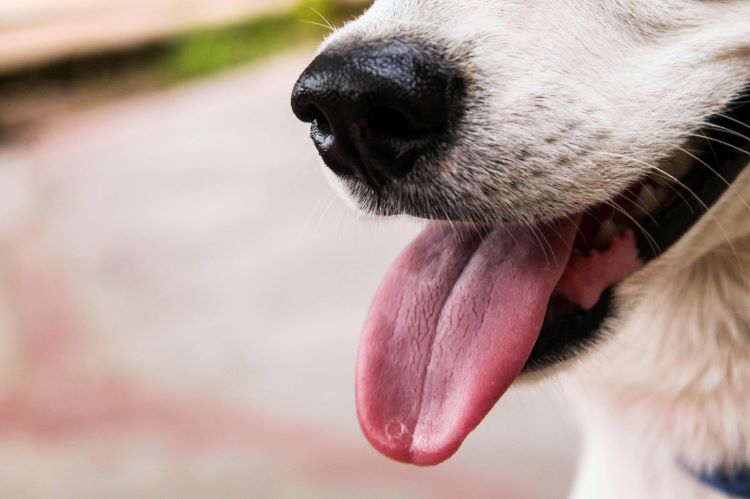Ready to help treat your pet to a healthy life?
Puppy Dental Care 101: a Guide for Pet Owners
By : Brianna Gunter | Updated Feb 6, 2025

Like most puppy owners, you want the best for your pet. You’re willing to do what it takes to help them grow into a healthy, happy adult dog and protect their well-being for life. But while you’re focusing on feeding your puppy wholesome food and making sure they get their daily exercise, don’t forget about their oral health. Much like humans, puppies require regular attention to dental hygiene to prevent potentially severe issues later on.
It’s always a good idea to consult with your pet’s veterinarian early on in their life about dental care and what you can do to help. But in the meantime, doing some research on your own will give you a leg up. From teething to establishing good oral habits, here's a little lesson in puppy dental care 101.
Puppy dental development
Puppies, like human children, go through stages of dental development. At around two to four weeks of age, their deciduous or “baby” teeth start to emerge. These teeth are temporary and will gradually be replaced by adult teeth as your pet grows up. By the time they reach 6 months of age, most puppies have a full set of 42 adult teeth.
As your puppy’s teeth are gradually replaced, you may sometimes spot a baby tooth pulled out by a chew toy or in your pet’s bowl. However, most teeth are presumably swallowed by your puppy and never seen In any case, never try to pull a puppy’s tooth out — you could end up causing harm to their mouth. As always, if you’re unsure about your pet’s development, consult their veterinarian.
Your puppy’s teeth are just as important as your own. When their mature adult teeth come in, there are no replacements. Veterinary dental care has certainly come a long way, but the best course of action with tooth and gum issues is always prevention.
Can puppies get cavities?
While cavities are rare in puppies, the truth is that dogs of any age can get cavities. Cavities, also known as dental caries, occur when bacteria in the mouth produce acids that damage tooth enamel. Over time, this process can lead to the formation of little holes or pits — a.k.a. “cavities.”
The incidence of caries in dogs is much lower than in humans. Tooth shape, diets low in fermentable carbohydrates, and different salivary pH levels are all thought to be contributing factors to this. Nevertheless, that doesn’t mean pet owners shouldn’t be vigilant. Dogs can still develop cavities if they consume sugary foods or if their teeth are not properly cared for.
Regular oral exams can allow identification of cavities when they are still small and treatable. Once they become very large, tooth extraction becomes the only option. Providing appropriate dental care for puppies and feeding a healthy diet is important for prevention. It's also essential to monitor your puppy's dental health and consult with your veterinarian if you have any concerns about their teeth.
The importance of prioritizing puppy dental health
Being vigilant about your puppy's oral health allows you to identify potential dental issues early on. This goes beyond just cavities. Dental issues that are allowed to progress can lead to periodontal disease, which causes long-term issues like tooth loss, abscesses, bleeding gums, and inability to eat properly (often due to pain).
Dog dental health has also been linked to overall health. According to the American Veterinary Medical Association (AVMA), periodontal disease has been found associated with changes in kidney, and liver, heart health.
Watch out for signs such as bad breath, swollen or bleeding gums, discolored teeth, difficulty chewing, and reluctance to eat. These symptoms may indicate underlying dental problems requiring prompt attention from your veterinarian.

8 tips for puppy dental care
Early introduction to dental care is key to setting a dog up for a lifetime of good oral health. Of course, that doesn’t mean it’s necessarily easy. Consider it a form of dog training — patience and persistence are the road to success.
Read on for more tips you can follow to practice great puppy dental care now and as your pet grows into an adult canine.
1. Ease into tooth brushing
Brushing your puppy’s teeth will take practice to get the hang of (for both of you), but it is integral to maintaining your pet’s dental health.
Begin by gently rubbing your puppy's gums with your finger to get them accustomed to the sensation. Gradually, introduce a finger brush or a soft-bristled toothbrush designed specifically for puppies. Use water at first to brush their teeth gently. Once your pet is accustomed to that, switch to a puppy-approved toothpaste (never use human toothpaste on a pet!)
Remember; positive reinforcement before, during, and after will help make the experience more enjoyable for your puppy.
Establishing a dental care routine
Consistency is key in maintaining your puppy's dental health. Aim for a regular dental care routine, incorporating brushing into your pet’s daily regimen. Choose a time when your puppy is typically calm and relaxed, such as after meals or before bedtime, to brush their teeth effectively.
2. Choose puppy-safe dental products
As mentioned above, you should never use human toothpaste or other dental care products on your dog. These can be harmful to your pet, especially if they swallow them. Dog-formulated toothpaste — available in various dog-friendly flavors at a lot of pet stores — is typically safe for pups to swallow and can even help make brushing a pleasant experience.
Even if you have an extra toothbrush of your own laying around, it’s a good idea to avoid using it on your pet. Opt for toothbrushes with small heads and soft bristles, suitable for your puppy's delicate gums. As with other pet dental care products, these can typically be found at pet stores or your local animal hospital.
3. Have your puppy’s teeth checked professionally
Your puppy’s veterinary team is there to help with every aspect of their health. Routine check-ups with an experienced veterinarian are crucial for monitoring puppy dental health, and some animal hospitals even have a specialist on staff that focuses on pet oral care.
During these visits, the veterinarian can assess the condition of your puppy's teeth and gums and identify any present dental issues. They’ll also be able to check for any retained deciduous/baby teeth or misaligned teeth (malocclusion). They can provide further guidance on proper dental care techniques, so don’t be afraid to ask questions! Professional cleanings may likewise be recommended to remove tartar and plaque buildup, preventing long-term issues.
Find out if pet insurance covers dental care.
4. Feed your puppy a healthy diet
Nutrition plays a vital role in supporting your puppy's dental health. Providing a balanced diet consisting of high-quality puppy food promotes overall well-being, including dental hygiene.
With this in mind, avoid feeding your puppy table scraps and treats that are high in sugar or carbohydrates. Not only can these contribute to dental decay and gum disease, but they can be detrimental to your puppy’s health as a whole.
5. Avoid unsafe chew toys
Chew toys serve as valuable tools in promoting dental health, appeasing natural chewing instincts, and alleviating teething discomfort in puppies. However, the wrong chew toy for a puppy can quickly do the opposite. In order to prevent damage to your pet’s teeth and gums, you’ll need to select chew toys carefully and know what to look for.
Opt for chew toys specifically designed for puppies, made of durable materials that withstand chewing and reduce the risk of choking hazards. Done right, chew toys can help remove plaque and tartar buildup, exercise the jaw muscles, and provide mental stimulation.
However, you also don’t want a toy that is too hard, or it can result in a broken tooth. Chews should have some give to them. Try pressing your thumbnail into the side to test this — if it doesn’t go in or make an indent, the chew is likely too hard. You can also try tapping it against your knee. If it’s hard enough to hurt, it’s likely too hard for your pet’s mouth.
Chew toy safety tips
- Always ask your veterinarian for recommendations.
- Avoid unsafe materials like rawhide, abrasive textures, has small parts, or anything that cracks or breaks easily.
- Choose chew toys that have some give to them — avoid hard plastic or anything that hurts your knee when you tap it.
- Look for age and dog size recommendations on toy packaging.
- Limit how long your puppy is chewing on a toy to prevent oral injury, and never let them chew unsupervised.
- If the toy breaks, shows signs of significant wear, or pieces come off, it’s time to throw it away and replace with a new safe pet chew toy.
6. Consider dental chews
Dental chews are not a substitute for healthy food or actual chew toys. However, in small amounts they can be an added preventive measure for good puppy dental health. Opt for dental chews made from natural and safe ingredients. Avoid chews that contain artificial additives, colors, and preservatives.
7. Don’t dismiss bad breath
Dogs are often said to have bad breath, but the truth is that this can be indicative of health issues. Bad breath in puppies is commonly caused by teething, but it can also stem from a mouth injury, periodontal disease, or even a metabolic illness.
Of course, a little bad breath here and there isn’t cause for concern. In many cases, it may simply be due to some temporary indigestion — which may be especially common as you switch your pet to adult dog food. Nevertheless, it may be time for a trip to the vet if your pup’s breath is chronically less than pleasant.
8. Practice good bowl hygiene
Bacteria can build up fast in a puppy’s food and water bowls. Make sure you’re cleaning them daily, and dispose of old food after it’s been sitting out for an hour.
Having ready access to clean water is another important part of maintaining good oral health (and health in general). Swap out your puppy’s water whenever it looks dirty, and at the very least change it daily. You may also want to consider a pet fountain with a filter.

Prioritize puppy health overall
By establishing healthy pet dental care early on, you can help your puppy maintain strong, healthy teeth and gums throughout their life. With regular dental care, proper nutrition, and preventive measures, you can help ensure your pet will enjoy good oral health throughout their lifetime.
Even so, accidents and surprise illnesses happen even with preventive care in place. While you can’t predict these situations, you can take charge of your puppy’s overall health by protecting them with dog insurance. A good medical insurance plan helps make it possible for your puppy to receive the veterinary treatment they need, when they need it.
Protect your pet’s health even further by learning puppy dangers every dog owner should know.
*Trupanion does not receive compensation for any products that are mentioned in this article. Linked products are for informative purposes only.
